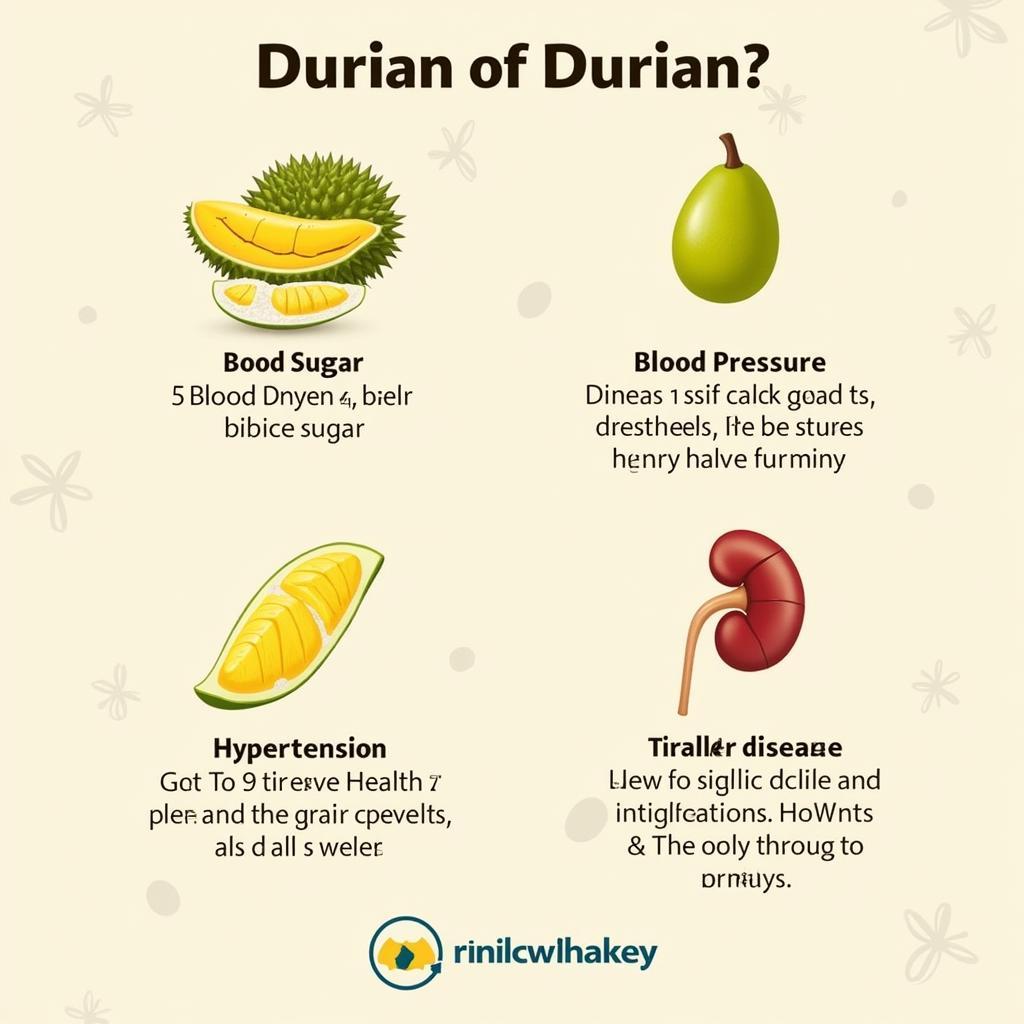Durian, the “King of Fruits,” is known for its pungent aroma and creamy texture. But what to avoid when eating durian? This guide explores the foods, drinks, and activities you should steer clear of when indulging in this unique tropical fruit to ensure a pleasant and safe experience. From alcohol to certain medications, understanding durian’s interactions can help you maximize enjoyment and minimize potential risks.
Unveiling Durian’s Interactions: Food and Drink Combinations to Avoid
Durian’s rich, creamy nature and high sugar content make it a delicious treat, but certain combinations can lead to discomfort or even health issues. Let’s explore what not to consume with durian.
Alcohol: Combining durian with alcohol is generally discouraged. Traditional beliefs and some anecdotal evidence suggest this combination can cause digestive upset, heartburn, and even a potentially dangerous spike in body temperature. While scientific evidence is limited, it’s best to err on the side of caution and avoid mixing these two.
Caffeinated Beverages: Similar to alcohol, caffeinated drinks like coffee, tea, and energy drinks are thought to interact negatively with durian. The combination could lead to heart palpitations and increased blood pressure.
Mangosteen: While a popular fruit in Southeast Asia, consuming mangosteen with durian is traditionally believed to lead to digestive issues.
Beef: In some cultures, beef and durian are seen as conflicting foods. It’s believed that their combined “heatiness” can cause imbalances in the body.
Beyond Food: Activities to Avoid After Eating Durian
Enjoying durian can be a sensory experience, but certain activities are best avoided immediately afterward.
Strenuous Exercise: Due to its high sugar and fat content, indulging in heavy exercise right after eating durian can lead to indigestion and discomfort.
Driving Long Distances: While not directly harmful, the strong smell of durian can linger in enclosed spaces like a car, potentially causing nausea or distraction during long drives.
Consuming Certain Medications: Durian contains compounds that can inhibit the breakdown of certain medications in the liver. Consult your doctor if you are taking any medication, particularly blood thinners or MAO inhibitors, before consuming durian.
Durian and Health Conditions: When to Exercise Caution
Certain pre-existing health conditions may require extra caution when consuming durian.
Diabetes: Durian’s high sugar content can significantly affect blood sugar levels. Individuals with diabetes should consult their doctor before consuming durian and monitor their blood sugar carefully.
Hypertension: Durian can increase blood pressure in some individuals. Those with hypertension should consume it in moderation and monitor their blood pressure.
Kidney Disease: Durian is rich in potassium, which can be harmful to individuals with kidney disease. Consult a healthcare professional before including durian in your diet if you have kidney issues.
 Durian and Health Conditions
Durian and Health Conditions
What Experts Say About Durian Consumption
“Durian is a nutrient-rich fruit, but moderation is key, especially when considering potential interactions,” says Dr. Amelia Nguyen, a registered dietitian specializing in Southeast Asian cuisine. “Understanding these interactions can help individuals enjoy durian safely and responsibly.”
“While traditional beliefs provide valuable insights, scientific research on durian interactions is still evolving,” adds Dr. Tran Van Minh, a leading researcher in food science. “Consulting a healthcare professional is always recommended for personalized advice.”
Conclusion: Enjoying Durian Responsibly
Durian offers a unique culinary experience, but understanding what to avoid when eating durian is crucial for maximizing enjoyment and minimizing potential risks. By being mindful of food and drink combinations, activities, and individual health conditions, you can savor the King of Fruits without any unpleasant surprises. Remember, moderation is key. For personalized advice on durian consumption, consult with a healthcare professional or a registered dietitian.
FAQ
- Can I eat durian with milk? (While not traditionally discouraged, some individuals experience digestive discomfort with this combination.)
- Is durian safe for pregnant women? (Consult your doctor for personalized advice.)
- How much durian is too much? (Moderation is key. Start with a small portion and monitor your body’s response.)
- Can I eat durian if I have high cholesterol? (Durian is high in fat, so consult your doctor if you have high cholesterol.)
- What are the benefits of eating durian? (Durian is rich in vitamins, minerals, and antioxidants.)
- Can I freeze durian? (Yes, durian can be frozen to extend its shelf life.)
- How can I tell if a durian is ripe? (A ripe durian will have a strong aroma and slightly yield to pressure.)
Related Articles
- Exploring the Culinary Delights of Hanoi
- Hanoi Street Food: A Must-Try Experience
- TRAVELCAR’s Hanoi City Tour: Unveiling Hidden Gems
Need help planning your Hanoi trip and exploring its culinary scene, including enjoying durian safely? Contact us at Phone: 0372960696, Email: TRAVELCAR[email protected], or visit our office at 260 Cau Giay, Hanoi. Our 24/7 customer service team is ready to assist you with airport transfers, private tours, and comfortable transportation in our 16, 29, and 45-seater vehicles.
